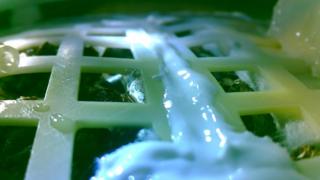China’s cotton seeds sprout on Moon
Seeds taken up to the Moon by China’s Chang’e-4 mission have sprouted, says China National Space Administration.
It marks the first time any biological matter has grown on the Moon, and is being seen as a significant step towards long-term space exploration.
The Chang’e 4 is the first mission to land on and explore the Moon’s far side, facing away from Earth.
It touched down on 3 January, carrying instruments to analyse the region’s geology.
Plants have been grown on the International Space Station before but never on the Moon.
The ability to grow plants on the Moon will be integral for long-term space missions, like a trip to Mars which would take about two-and-a-half years.
It would mean that astronauts could potentially harvest their own food in space, reducing the need to come back down to Earth to resupply.
The Chinese Moon lander was carrying among its cargo soil containing cotton and potato seeds, yeast and fruit fly eggs.
The plants are in a sealed container on board the lander. The crops will try to form a mini biosphere – an artificial, self-sustaining environment.
On Tuesday, Chinese state media said the cotton seeds had now grown buds.
The ruling Communist Party’s official mouthpiece the People’s Daily tweeted an image of the sprouted seed, saying it marked “the completion of humankind’s first biological experiment on the Moon”.
Fred Watson, Australian Astronomical Observatory’s astronomer-at-large, told the BBC the development was “good news”.
“It suggests that there might not be insurmountable problems for astronauts in future trying to grow their own crops on the moon in a controlled environment.”
“I think there’s certainly a great deal of interest in using the Moon as staging post, particularly for flights to Mars, because it’s relatively near the Earth,” Mr Watson said.
“We have given consideration to future survival in space,” Prof Xie Gengxin, the experiment’s chief designer, was quoted as saying in the South China Morning Post.
“Learning about these plants’ growth in a low-gravity environment would allow us to lay the foundation for our future establishment of space base.”
He said the cotton could be used for clothing while the potatoes could be a food source for astronauts and the rapeseed for oil.
Source: Read Full Article



